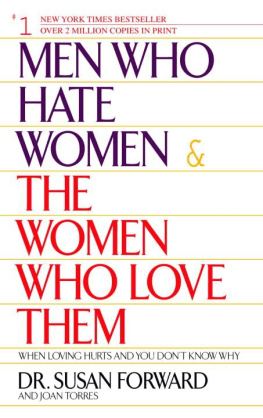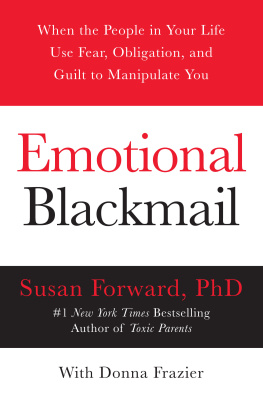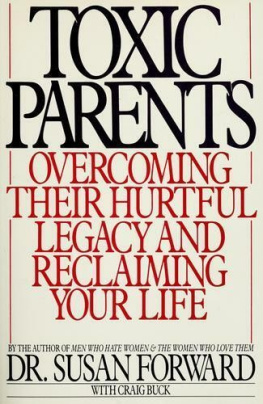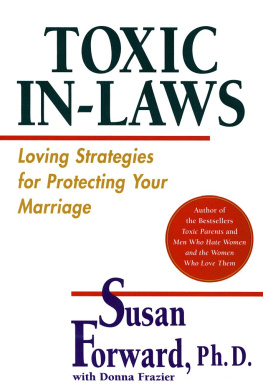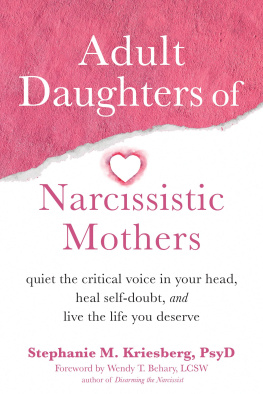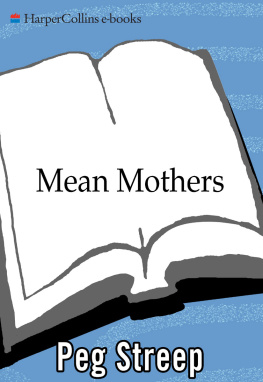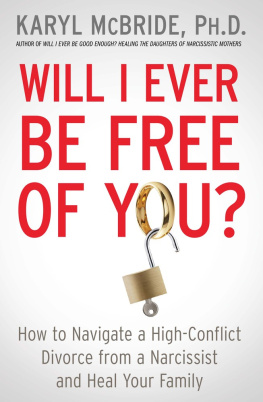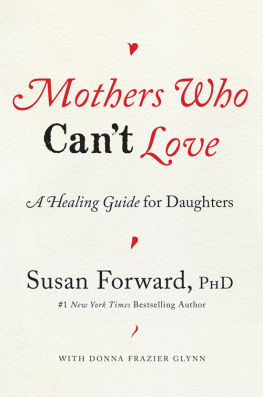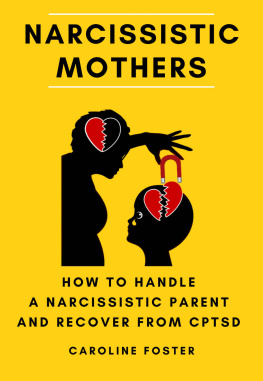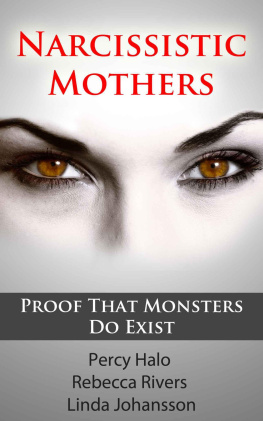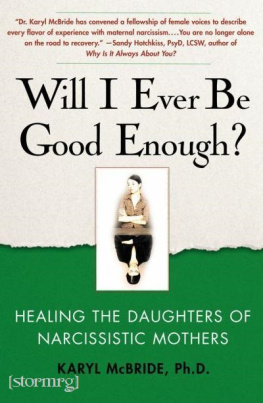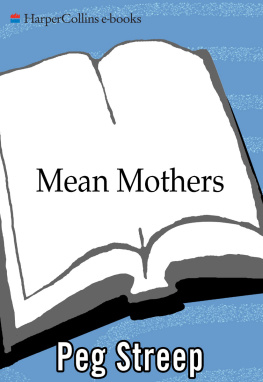Mothers Who Cant Love
A Healing Guide for Daughters
Susan Forward, PhD
with Donna Frazier Glynn

To my treasured daughter, Wendy
Contents
Dont you dare say anything bad about your mother.
But what about me ?
You are my whole life.
Because I said so.
I depend on you to take care of everything.
Youre always causing trouble.
Im starting to see it wasnt all my fault.
It feels so good to get it all out.
Im ready to face the feelings Ive pushed down for so long.
I see that change is really hard, but not changing is harder.
I would never have believed I had the right to say no.
I finally feel like an adult.
Its come down to a choice between my mother and my well-being.
I have to be there for her. After all, she is still my mother.
I was on a business trip to Wisconsin. I had been cooped up inside all day and I wanted to get some air. The sun was out, so at the lunch break, even though it was pretty cold outside, I decided to take a short walk. I looked for the sunniest spot I could find, but you know it was the damnedest thingit sure looked like the sun and it was bright like the sun, but there was absolutely no warmth coming from it. And this wave of sadness came over methe sun was just like my mother.
Heather, a petite, thirty-four-year-old sales rep for a large pharmaceutical company, became teary as she spoke. She was expecting her first child and was frightened that she might be at risk of becoming the same kind of mother shed had.
HEATHER: You know, for the longest time, I couldnt even think about being a mom myself. I felt so lucky when I met Jim after a series of bad relationships and I realized that someone could really love me. Weve wanted to have a baby for a long time, but I was so afraid there was something wrong with me. Like maybe all the coldness from my mom would start coming out of me once I was pregnant. I couldnt bear the thought that I might ever be that way with my own child.
Its the kind of upsetting story Ive heard again and again from women who carry with them a legacy of pain, fear, and turmoil because of the profound emotional wounds inflicted by their mothers.
In more than thirty-five years as a therapist working in a variety of clinical settings, Ive seen large numbers of women like Heather, who, knowingly or unknowingly, are caught in the damaging emotional orbit of the women who brought them up and are struggling to escape. They come to therapy sessions with anxiety and depression, relationship problems, lack of confidence, concerns about their ability to stand up for themselves, or even to love. Some are able to make a connection between their relationship with their mothers and the difficulties in their lives. Others mention, My mother is driving me crazy, but consider that to be secondary to the issues that bring them to me.
Often theyre sorting through confusing mixed messages, hoping to prove themselves wrong about the pain they carry from the past.
I needed to hear more about the fears Heather was carrying into motherhood, so I asked her to tell me what she meant specifically by the coldness from my mom that she was so afraid of replicating with her own child. She began hesitantly:
HEATHER: It was like my mom had two sidesshe gave me birthday parties, sometimes she came to events at schoolshe could even be nice to my friends. But then she had this other side....
And what was that like? I asked.
HEATHER: Well, she criticized me an awful lotbut to tell you the truth, most of the time she ignored me, like I wasnt even worth her time. I dont knowmaybe the nice things she did were all for show. But Ill tell you, I sure didnt get to feel safe around herthere was no real bond or kindness.... I never felt important to her. I was just something she had to deal with when it suited her. But she was busy. You cant blame a single mom for being distracted.
Like so many women, Heather could speak candidly about how shed been treated. Yet she grasped for ways to minimize the hurt and struggled to see her mother as something shed rarely been: loving.
What Makes a Good Mother?
A good mother is not expected to be perfect and self-sacrificing to the point of martyrdom. She has her own emotional baggage, her own scars, her own needs. She may have work that she doesnt want to compromise, and there may be times when shes not available to her daughter. She may lose her temper, and say or do things to her daughter that she regrets. But if her dominant behavior engenders in her daughter a belief in her own value and nourishes her self-respect, confidence, and safety, that mother is doing a good job, whether shes a wonderful mom or just good enough. Shes demonstrating real love, in a tangible, reliable way, to her child.
Thats not the kind of mothering Heather, and so many other women, experienced. For them, nourishing love and attention always came drop by drop. Behind closed doors, those intermittent splashes of warmth inevitably gave way to a reality that outsiders rarely saw: Their mothers tore them down, competed with them, icily ignored them, took credit for their achievements, failed to protect them, or even abused them. But love them? No. Loving is consistent overall behavior, and daughters like Heather were starved for its nurturing warmth.
The High Cost of Missing
a Mothers Love
The effects of growing up this way are painful and wounding. Girls define their emerging womanhood by identifying and bonding with their moms. But when that vital process is distortedbecause their mothers are abusive, critical, smothering, depressed, neglectful, or distanttheyre left to struggle alone to try to find a solid sense of themselves and their place in the world.
It rarely occurs to them that their mothers were not loving, or even, in extreme cases, that they were malevolent. Thats too hard to admit, and allowing in that possibility produces acute anxiety in children, whose survival is so closely tied to their vital caretaker. Its far safer for a child to believe that if theres something wrong between us, its because theres something wrong with me . She makes sense of her mothers hurtful behavior by turning it into self-blame and feelings of inadequacy and badness, feelings that persist into adulthood no matter how accomplished she is or how much she is loved by others, including her own children.
A little girl who was criticized or ignored or abused or stifled by an unloving mother becomes an adult who tells herself shell never be good enough or lovable enough, never smart or pretty or acceptable enough to deserve success and happiness. Because if you really were worthy of respect and affection , a voice inside whispers, your mother wouldve given them to you .
If you were that little girl, the daughter of a mother who couldnt give you the love you needed so much, its likely that much like Heather, you now go through your days with a cavernous gap in your confidence, a sense of emptiness and sadness. Youre never truly comfortable in your own skin. You may not trust your ability to love. And you cant step fully into your life until you heal that gaping mother wound.
Why Im Writing This Book Now
My session with Heather brought that painful reality home to me once again, and I thought about her long after our session was over. She was intelligent, attractive, and accomplished, yet those qualities seemed largely invisible to her. She doubted her ability to love and be loved, and, Id discover, she felt like a fraud, ever fearful that there was something wrong with her, despite all evidence to the contrary. Self-aware as she was, at age thirty-four she was still waiting for a mothers acknowledgment and blessing to give her confidence, faith in herself as a woman, a partner, a mother. And it would probably never come. When a strong mother bond is missing, women often struggle for a lifetime with a bewildering sense of loss and a sense of deprivation.
Next page

